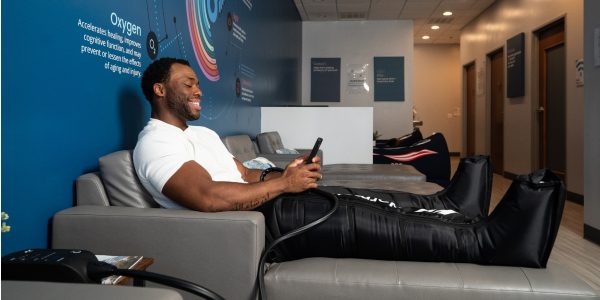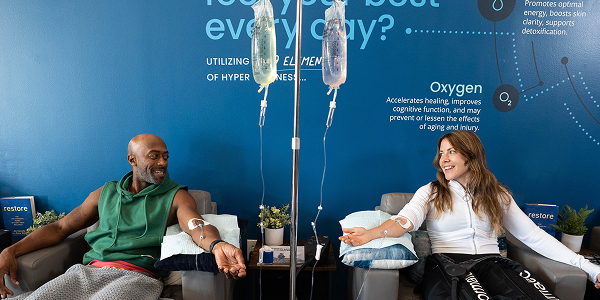If you’ve gone back to the gym or gone on a long run after a long rest period, you’ve probably experienced soreness.
Getting sore is common after intense training, but if the pain lingers, it can be a sign that your muscles need more recovery—or that your body isn’t adapting as efficiently as it could. Fortunately, there are numerous strategies to alleviate this discomfort and ensure you stay on track with your fitness goals.
Preventing Soreness with Consistent Workouts
One of the best ways to manage soreness is with consistency in your workout routine. When you exercise regularly, your body adapts to the physical stress, reducing the intensity and duration of muscle soreness over time. Incorporating a mix of strength training, cardio, and flexibility exercises helps your muscles recover and grow stronger. Here are a few tips to keep in mind:
- Warm-Up Properly: Always start your workout with a good warm-up for at least 5 minutes. This increases blood flow to your muscles, making them more pliable and ready for exercise.
- Gradual Progression: Avoid jumping into intense workouts too quickly. Gradually increasing the intensity and duration of your exercises helps your body adapt without causing excessive strain.
- Active Recovery: Incorporate low-intensity activities like walking, swimming, or yoga as active recovery on your rest days to promote circulation and aid muscle recovery.
Post-Workout Nutrition
What you eat after a workout can significantly influence your recovery process. Nutrition can help replenish glycogen stores, repair muscle fibers and reduce inflammation. To help maximize recovery, focus on:
- Protein: Consuming protein helps repair and build muscle tissue. Aim for a protein-rich snack or meal within 30 minutes to two hours after your workout. Good sources include lean meats, eggs, dairy or plant-based options like beans and legumes.
- Carbohydrates: Carbs are essential for replenishing glycogen, how your muscles store energy. Pairing carbs with protein post-workout within 30 minutes enhances glycogen synthesis and recovery.
- Hydration: Don’t forget to rehydrate! Water is crucial for recovery to help transport nutrients to your cells and remove waste products from muscle metabolism.
Mild Hyperbaric Oxygen Therapy
Mild Hyperbaric Oxygen Therapy (mHbOT) is a highly effective recovery method. It involves breathing enhanced oxygen in a pressurized chamber, which can increase oxygen levels in your blood and promote faster healing of tissues.
Benefits may include:
- Enhanced Muscle Repair: Increased oxygen delivery to your tissues accelerates the repair process of damaged muscles.
- Reduced Inflammation: mHbOT can help decrease inflammation and swelling, common issues after intense workouts.
- Improved Endurance: Regular sessions may help your body’s oxygen utilization, boosting your stamina and performance with consistent use.
Cryotherapy
Cryotherapy is a recovery therapy that involves safely exposing your body to sub-zero temperatures for 2-3 minutes. It can be done through Whole Body Cryotherapy chambers or localized Cryotherapy treatments.
The benefits are significant and may include:
- Reduced Muscle Soreness: The cold exposure helps reduce inflammation and muscle soreness, speeding up recovery times.
- Enhanced Circulation: Cryotherapy stimulates blood flow, which aids in the delivery of nutrients and the removal of metabolic waste from your muscles.
- Mental and Physical Rejuvenation: The cold can trigger the release of endorphins, helping to improve your mood and energy.
Infrared Sauna
Infrared Saunas are another excellent recovery tool, offering a soothing and therapeutic way to alleviate soreness. Unlike traditional saunas that heat the air, Infrared Saunas use infrared light to penetrate your skin and directly heat your body.
The advantages may include:
- Muscle Relaxation: The deep heat from Infrared Saunas can help relax tense muscles and increase blood flow which is essential for recovery.
- Detoxification: Sweating in an Infrared Sauna can help remove toxins from your body which can reduce muscle fatigue.
- Pain Relief: Infrared heat can alleviate joint and muscle pain, making it a great option for those suffering from chronic soreness.
Foam Rolling and Stretching
Foam rolling and stretching are cornerstone practices for maintaining flexibility and preventing injuries. These techniques help to release muscle tightness, improve blood flow, and enhance overall performance.
Here’s how to incorporate them effectively:
- Foam Rolling: Use a foam roller to apply pressure to specific muscle groups, breaking up adhesions and promoting muscle relaxation. Spend a few minutes rolling each major muscle group after your workouts.
- Compression: Like foam rolling, Compression applies dynamic pressure to your arms, legs and hips to help improve recovery and reduce muscle aches and pain.
- Dynamic Stretching: Before exercising, engage in dynamic stretches that mimic the movements you’ll be performing. This prepares your muscles and joints for activity.
- Static Stretching: After your workout, perform static stretches, holding each stretch for 20-30 seconds. This helps lengthen and relax your muscles, reducing the risk of post-exercise tightness.
Recovery is a crucial aspect of any fitness regimen. By incorporating consistent workouts, proper nutrition and science-backed therapies like mHbOT, Cryotherapy, Infrared Saunas and Compression, you can help minimize soreness, prevent injuries and enhance your overall performance. Remember, recovery isn’t just about resting; it’s about actively supporting your body’s ability to heal and grow stronger. Bookmark this article for the next time you’re feeling sore!
We want to help you stay active, stay healthy and most importantly, listen to your body! If you have recovery questions or want a 30-day Wellness Plan, talk to one of our Wellness Reps at your nearest studios. We love to help our clients feel better and accomplish their goals.
Book your recovery appointments today.
Medical services are provided by an independently-owned physician practice. Some services may require medical clearance and a prescription. We reserve the right to refuse service to anyone. Services, therapies, ingredients and prices may vary per location. The content on our site, blog posts, educational materials, app, promotional newsletters, and any other written content are not intended to replace an evaluation with a qualified healthcare professional and are not intended as medical advice.



.jpg)


